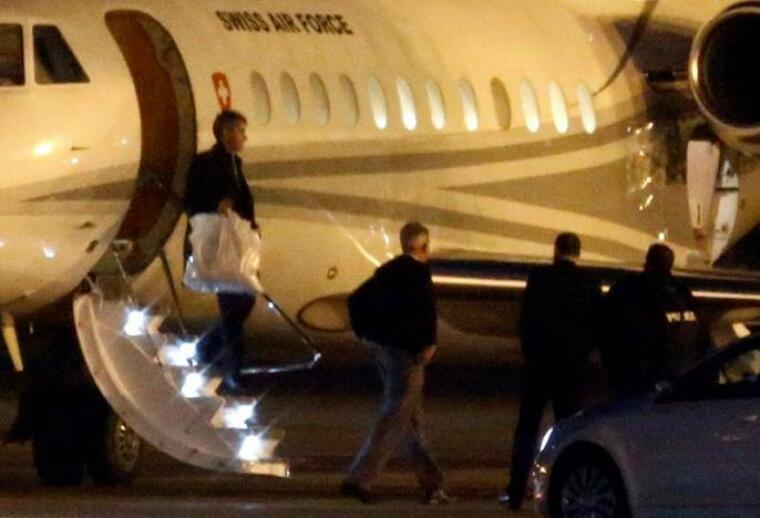U.S. State Dept. admits payment of $400 million to Iran during release of Pastor Saeed Abedini and other prisoners
U.S. State Department spokesman John Kirby admitted on Thursday that the U.S. government released $400 million in cash to Iran for the release of four American prisoners including Pastor Saeed Abedini. Kirby said that they delayed releasing the money for several hours for leverage to make sure that the U.S. citizens were released the same day.

At a press conference held on Aug. 4, U.S. President Barack Obama denied paying ransom for the hostages. "We do not pay ransom. We didn't here, and we won't in the future," he declared at the conference. The State Department's announcement came after a report by the Wall Street Journal on Aug. 3 revealed that the Justice Department objected to the cash payment as the four Americans were released.
In another report from the Wall Street Journal, U.S. officials revealed that the Iranian government was demanding the return of the $400 million that was deposited by the Shah into a Pentagon trust fund in 1979 to buy U.S. fighter jets. Lawmakers believe that the payment could be used to fund Iran's allies which includes Assad's regime and Hezbollah.
Senator Tom Cotton is concerned that payment sends a dangerous message to terrorists around the world. "It doesn't really matter though what President Obama says. It matters what the Iranians think and it matters what dictators and terrorists and gangsters all around the world think. And they clearly think that this was a ransom payment ... That's why it's so dangerous," Cotton told Fox News.
The United States had been negotiating with Iran since November 2014 before the prisoners were released. The four released prisoners — Abedini, Washington Post Tehran Bureau Chief Jason Rezaian, former U.S. Marine Amir Hekmati and businessman Nosratollah Khosrawi-Roodsari — were all born in Iran and held dual U.S.-Iranian citizenship.
While he was still in prison, Abedini wrote a public letter revealing that he was psychologically and physically tortured. Abedini's wife, Naghmeh, worked relentlessly for his release. However, Abedini revealed in an April interview with Christianity Today that his wife had filed for legal separation and a restraining order against him.
 Christians don't have to affirm transgenderism, but they can’t express that view at work: tribunal
Christians don't have to affirm transgenderism, but they can’t express that view at work: tribunal Archaeology discovery: Medieval Christian prayer beads found on Holy Island
Archaeology discovery: Medieval Christian prayer beads found on Holy Island Presbyterian Church in America votes to leave National Association of Evangelicals
Presbyterian Church in America votes to leave National Association of Evangelicals Over 50 killed in 'vile and satanic' attack at Nigerian church on Pentecost Sunday
Over 50 killed in 'vile and satanic' attack at Nigerian church on Pentecost Sunday Ukrainian Orthodox Church severs ties with Moscow over Patriarch Kirill's support for Putin's war
Ukrainian Orthodox Church severs ties with Moscow over Patriarch Kirill's support for Putin's war Islamic State kills 20 Nigerian Christians as revenge for US airstrike
Islamic State kills 20 Nigerian Christians as revenge for US airstrike Man who served 33 years in prison for murder leads inmates to Christ
Man who served 33 years in prison for murder leads inmates to Christ


 Nigerian student beaten to death, body burned over ‘blasphemous’ WhatsApp message
Nigerian student beaten to death, body burned over ‘blasphemous’ WhatsApp message 'A new low': World reacts after Hong Kong arrests 90-year-old Cardinal Joseph Zen
'A new low': World reacts after Hong Kong arrests 90-year-old Cardinal Joseph Zen Iran sentences Christian man to 10 years in prison for hosting house church worship gathering
Iran sentences Christian man to 10 years in prison for hosting house church worship gathering French Guyana: Pastor shot dead, church set on fire after meeting delegation of Evangelicals
French Guyana: Pastor shot dead, church set on fire after meeting delegation of Evangelicals ‘Talking Jesus’ report finds only 6% of UK adults identify as practicing Christians
‘Talking Jesus’ report finds only 6% of UK adults identify as practicing Christians Mission Eurasia ministry center blown up in Ukraine, hundreds of Bibles destroyed: 'God will provide'
Mission Eurasia ministry center blown up in Ukraine, hundreds of Bibles destroyed: 'God will provide' Church holds service for first time after ISIS desecrated it 8 years ago
Church holds service for first time after ISIS desecrated it 8 years ago Burger King apologizes for 'offensive campaign' using Jesus' words at the Last Supper
Burger King apologizes for 'offensive campaign' using Jesus' words at the Last Supper Uganda: Muslims abduct teacher, burn him inside mosque for praying in Christ’s name
Uganda: Muslims abduct teacher, burn him inside mosque for praying in Christ’s name